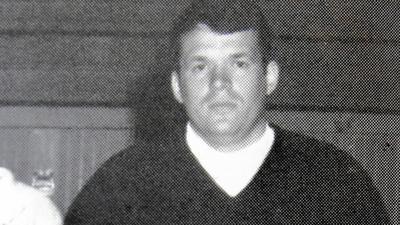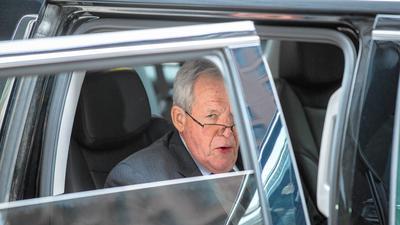|
Slowik: Sexual predators use power to silence victims with fear, lies
By Ted Slowik
It's difficult to grasp the power that child sex predators hold over their prey. The fear they instill in their victims and the convincing lies they tell are keys to understanding people like Dennis Hastert, who U.S. District Judge Thomas M. Durkin said was a "serial molester." The stunning revelation of Hastert as the highest-ranking American politician known to have publicly admitted to sexually abusing minors deserves exploration of tough questions. How could a monster with such dark secrets achieve such power? Why did his victims remain silent for so long? What motivates victims to pursue compensation from those responsible for their suffering? For help finding answers, I reached out to Tim Placher, an attorney and teacher who won awards for his Southtown columns describing his experience being abused by a priest as a teen. Placher agreed to share his insight with readers and offer the perspective of a survivor who surrendered his privacy in pursuit of accountability. Threads connect Placher's abuse by the late Rev. Richard Ruffalo to the teen boys abused by Hastert, including Scott Cross, brother of former state representative and Illinois House Majority Leader Tom Cross. Their experiences happened in the 1970s and included despicable acts committed by men of power. Hastert, a teacher and wrestling coach at the time, leveraged his popularity to become the longest-serving Republican Speaker of the U.S. House of Representatives, second in line to the presidency. Back in the day, though, no authority figure was more powerful than the parish priest. Child sex predators control their victims with fear and lies. Authority figures — priests, teachers, coaches — evade justice by intimidating their victims. "Their career is a house of cards built on the silence of victims fearful of confronting the status and prestige of their victimizers," Placher said. Placher earned an Associated Press award and Peter Lisagor Award for Exemplary Journalism in 2007 for a first-person column in which he related the story of his abuse. He understands the difficulty with which Scott Cross made the decision to publicly confront Hastert in court. When Placher wrote his column, he initially withheld publication of it for a week while he and his family considered the repercussions of going public, he said. Authority figures accused of sexually abusing children have their defenders who try to discredit accusers, ultimately making it more difficult for others to report abuse. "I wasn't as fearful about the world coming down on me because I had built a rapport with readers," Placher said. "I knew I wouldn't be subject to scorn and derision because (readers) trusted me. That put me on a footing level with the authority figure." Cross told the media he went public because he wants his children and others to know there is an alternative to staying silent. Years before Placher went public, he was an unnamed source for stories I wrote about Joliet Diocese priests who sexually abused children. As I investigated the issue in 2002, at times it felt the abuse was the worst-kept secret in town. I spoke with many of Placher's former classmates and others, and those who didn't have personal encounters to relate often said boys at the time would call a molester "Gacy" behind his back or joke about not being the last one in the locker room and left alone with a reputed molester. In one story, I revealed too many details of Placher's identity, and he was angry with me at the time. I was devastated at having inadvertently violated his trust. People who accuse authority figures of sexually abusing children are not automatically hailed as heroes for exhibiting bravery by coming forward. It would be a few more years before Placher was ready to go public. "At that point I had the confidence level that I was not going to be ostracized or vilified," he said. The act that finally drove Placher to attach his name to his story was publication of Joliet Bishop Joseph Imesch's sworn deposition about the extent of abuse by priests. Imesch responded to questions by Minneapolis attorney Jeff Anderson about 17 priests accused of abusing children. "Ruffalo," Anderson asked. "What about Ruffalo?" "I'm not sure of that," Imesch answered. Placher wrote in his column: "'Not sure,' Imesch said, despite the fact the Joliet Diocese previously had paid a settlement to a man who claimed he'd been abused by the Rev. Richard Ruffalo when the priest was pastor at St. Mary's Parish in Park Forest in the late 1970s and early 1980s." I was reminded of Imesch's skepticism while under oath about Ruffalo when Hastert was in court and questioned by Judge Durkin. "You said you mistreated athletes. Did you sexually abuse Mr. Cross? Durkin asked Hastert. "I — I don't remember doing that, but I accept the statement," Hastert replied. In the words of Hastert and Imesch I hear a striking similarity. To me it sounds like a defiant refusal to accept responsibility and an unrelenting effort to cast doubt upon the credibility of accusers. What I learned from men who were sexually abused as children is that the experience is one they can never forget. The sexual abuse of a minor robs that individual of innocence and future potential. The lasting effects can be as devastating as the death of a child or spouse. For some, it defines them, for better or worse. Many abuse drugs or alcohol, struggle with relationships, or suffer professionally because of anxiety and depression. Others achieve a state of balance, forgive their abusers and make peace with their pasts. Some are driven by a strong sense of justice and work tirelessly to protect others by advocating for accountability. Some, through counseling and therapy, learn the difference between victims and survivors. Victims allow themselves to engage in unhealthy coping mechanisms because of what happened to them. Survivors summon the courage to say, "I'm going to be defined not by what happened to me, but by how I respond to it." That's why Placher, Cross and others go public. It's also why others, like Individual A, hope to pursue justice while preserving their privacy. Before being sentenced on Wednesday to 15 months in prison for illegally withdrawing large sums of his money from banks, Hastert lied to authorities and said Individual A was attempting to extort money from him. In a separate proceeding, Individual A is pursuing a civil lawsuit against Hastert, seeking $1.8 million of $3.5 million he says Hastert agreed to pay him. Those who think greed motivates victims to seek compensation are mistaken. Hastert tried to buy his victim's silence to preserve his dark secret and maintain his charade as a good person. When he was caught, Hastert lied by depicting his prey as a blackmailer. Authorities investigated Individual A as a criminal until they realized he was a victim. This kind of response to claims of childhood sexual abuse by powerful men is why it remains difficult for people to come forward. The day after Hastert's sentencing, Illinois Attorney General Lisa Madigan called for removal of the statute of limitations for sex crimes against children. "Illinois law should allow children who have been victims of sexual assault and abuse the time to come forward and report their crimes. Survivors of sexual assault crimes during their childhood should be afforded the time it takes to process their assault and come forward to report their crimes to authorities," Madigan said in a statement. There's good reason why the law needs to be changed. Powerful predators use fear and lies to silence their victims. Survivors deserve all the help they can get to report the truth and seek justice. Contact: tslowik@tribpub.com
|
.
Any original material on these pages is copyright © BishopAccountability.org 2004. Reproduce freely with attribution.


